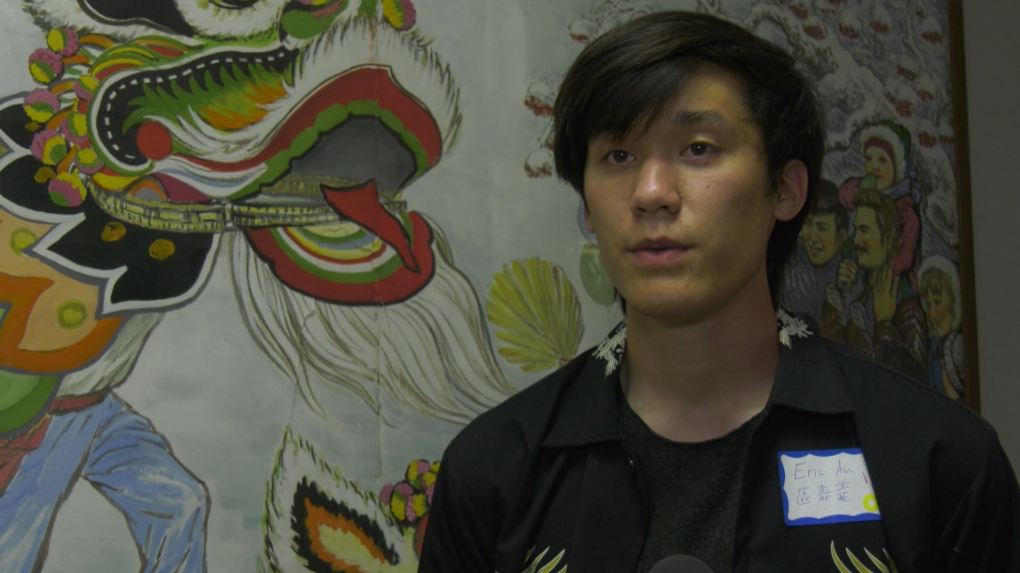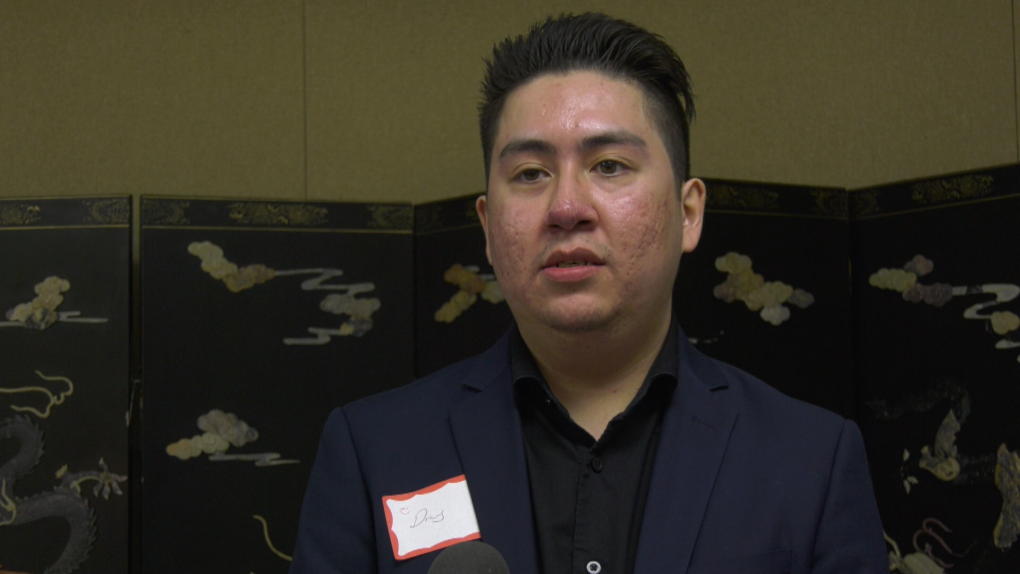From intergenerational trauma to resilience: Edmonton Chinese and Indigenous youth conference builds understanding
Two groups of youth gathered in Edmonton's Chinatown this weekend to help exchange ideas and share their cultures to build greater solidarity.
For the first time in-person, youth from the Enoch Cree Nation and the local Chinese community hosted a series of panels, discussions, and forums, all centred on anti-racism and resiliency.
"We wanted to come together to build understanding between our communities and really get to know each other and building that relationship between the youth and the elders," said Eric Au, Chinese Benevolent Association of Edmonton Youth Council chair.
On Saturday, both groups participated in cultural demonstrations with a powwow, drumming circle, martial arts, and Indigenous and Chinese dances.
The focus turned to anti-racism on Sunday, with discussions demonstrating how racism and intergenerational trauma have impacted Indigenous and Chinese communities in different and parallel ways. The event culminates on Monday with a youth action planning project to help both communities concretely move forward together.
"As we grow up and go through the school system, we get an introduction to Indigenous history and the issues that non-white people face, but really, the need to learn is not very satisfied," Au added.
 Eric Au, Chinese Benevolent Association of Edmonton Youth Council chair, said the pair of youth groups hope to host more events like the cultural conference in the future (CTV News Edmonton/Jessica Robb).
Eric Au, Chinese Benevolent Association of Edmonton Youth Council chair, said the pair of youth groups hope to host more events like the cultural conference in the future (CTV News Edmonton/Jessica Robb).
Dreydon Thomas, Enoch Youth Advisory Council member, explained how the Indigenous reserve system and historical attitudes and policies surrounding Chinatowns across Canada share similarities.
"Chinatowns come out of segregation in Canada, and as new Chinese immigrants used to come here they were put in areas where white people did not want to be," Au said.
"Indigenous peoples, in general, we've been placed on reservations, but also Chinese people have placed, segregated or even pushed to building in Chinatown places. That's where our groups feel comfortable and feel more like a community for ourselves.
"It's important to recognize that these spaces that come out of racist policies and disadvantages to non-white communities also create a place where we can come together and celebrate our cultures."
The youth councils hope that having these "hard-hitting" and difficult conversations will pave the way forward for a better future.
"It can get scary at times," Thomas said. "Building these relationships kind of help us in being able to tackle even bigger decisions, questions, and bigger difficulties."
"It shows the level of maturity and level of support not only to us but to different levels of government that we are able to have these conversations."
 Dreydon Thomas, Enoch Youth Advisory Council member, said while discussing anti-racism can be difficult at times, finding out about shared experiences builds trust and resiliency (CTV News Edmonton/Jessica Robb).
Dreydon Thomas, Enoch Youth Advisory Council member, said while discussing anti-racism can be difficult at times, finding out about shared experiences builds trust and resiliency (CTV News Edmonton/Jessica Robb).
HOPE FOR THE FUTURE
Sixty-five people registered to attend the weekend conference, with proceedings open to respective community members and all Edmontonians.
"If we want long-lasting solutions and we want to connect with those people, it has to be together," Au said.
For Amanda Morin, Enoch Cree Nation councillor, this weekend's conference represents the start of something greater.
"Speaking as an Indigenous woman, we were taught from our history in residential schools and colonialism to not speak," she told CTV News Edmonton. "That spaces weren't safe.
"It's super important as an Indigenous woman, as a mom, as a grandma, as a daughter, a sister, a friend, to be able to create these spaces so that our youth can start breaking those cycles of intergenerational trauma and we now call it intergenerational resiliency, so we can overcome."
As she listened to the youth and elders tackle different issues and approaches to anti-racism, Morin said she was encouraged to see the youth gain more courage to speak and engage.
"It makes me really happy," Morin said. "If you create the space, a safe space, those difficult conversations are no longer difficult and you can find a lot of love and support there.
"As each of our generations come along, they're realizing how similar we all are as humans.
"Realizing that we are not alone in a lot of things we've gone through. Regardless of our race, we're all human and being able to connect and share gives us all hope."
With files from CTV News Edmonton's Jessica Robb
CTVNews.ca Top Stories

BREAKING Iran fires at apparent Israeli attack drones near Isfahan air base and nuclear site
An apparent Israeli drone attack on Iran saw troops fire air defences at a major air base and a nuclear site early Friday morning near the central city of Isfahan, an assault coming in retaliation for Tehran's unprecedented drone-and-missile assault on the country.
NEW After hearing thousands of last words, this hospital chaplain has advice for the living
Hospital chaplain J.S. Park opens up about death, grief and hearing thousands of last words, and shares his advice for the living.
American millionaire Jonathan Lehrer denied bail after being charged with killing Canadian couple
American millionaire Jonathan Lehrer, one of two men charged in the killings of a Canadian couple in Dominica, has been denied bail.
Ontario woman loses $15,000 to fake Walmart job scam
A woman who recently moved to Canada from India was searching for a job when she got caught in an online job scam and lost $15,000.
Prince Harry formally confirms he is now a U.S. resident
Prince Harry, the son of King Charles III and fifth in line to the British throne, has formally confirmed he is now a U.S. resident.
Colin Jost names one celebrity who is great at hosting 'Saturday Night Live'
Colin Jost, who co-anchors Saturday Night Live's 'Weekend Update,' revealed who he thinks is one of the best hosts on the show.
Ottawa to force banks to call carbon rebate a carbon rebate in direct deposits
Canadian banks that refuse to identify the carbon rebate by name when doing direct deposits are forcing the government to change the law to make them do it, says Environment Minister Steven Guilbeault.
DEVELOPING G7 warns of new sanctions against Iran as world reacts to apparent Israeli drone attack
Group of Seven foreign ministers warned of new sanctions against Iran on Friday for its drone and missile attack on Israel, and urged both sides to avoid an escalation of the conflict.
Some Canadian families will receive up to $620 per child today
More money will land in the pockets of some Canadian families on Friday for the latest Canada Child Benefit installment.






























